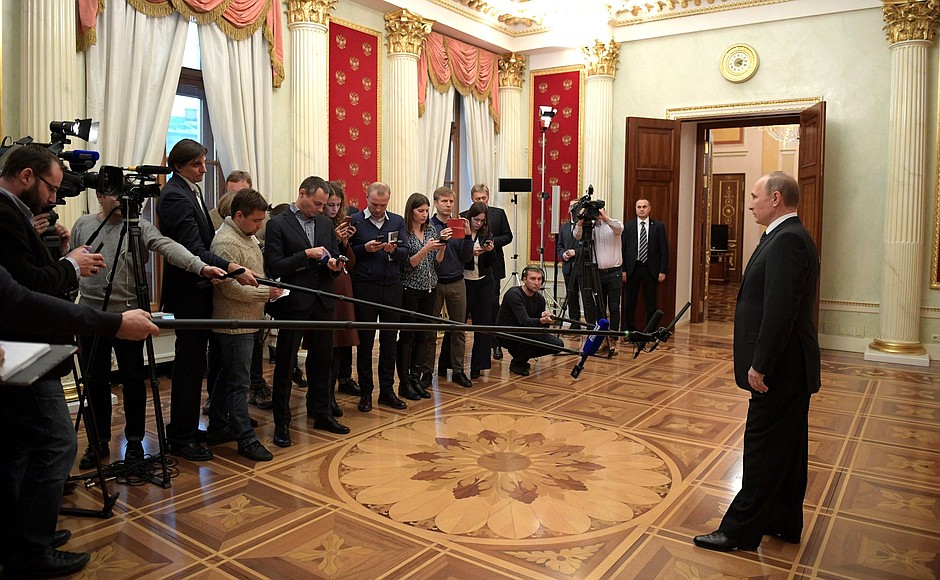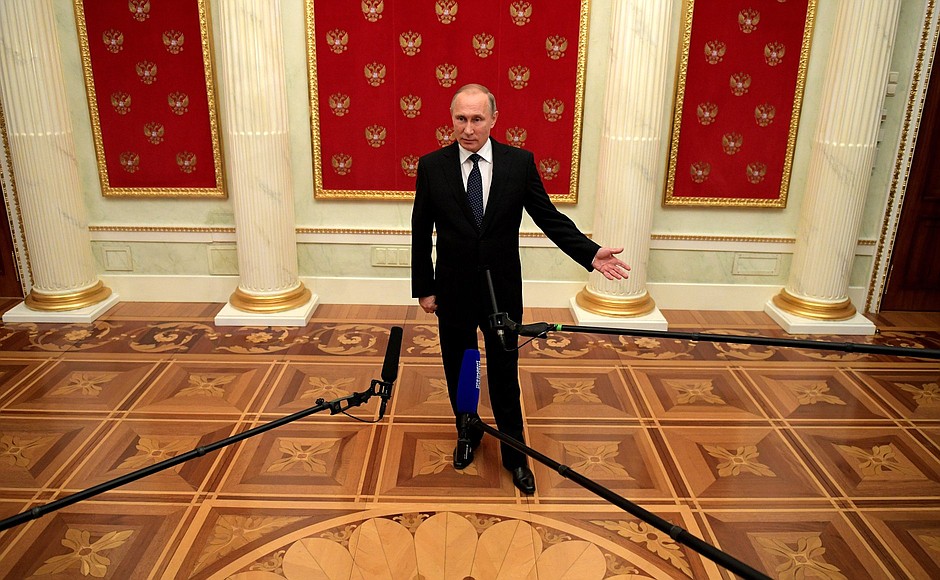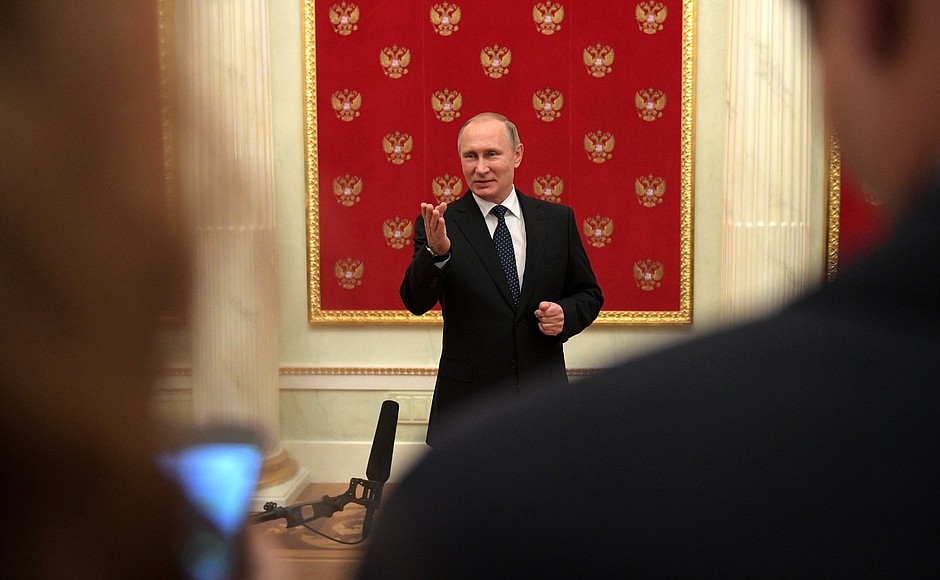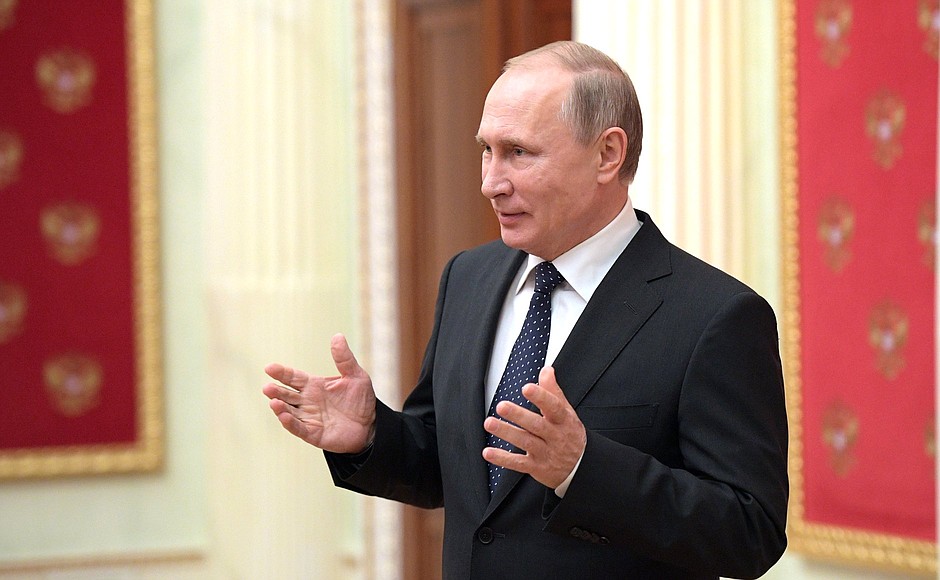President of Russia Vladimir Putin: It seems a few things still need clarification following today’s Council meeting. Please, go ahead.
Question: You talked today about maintaining the financing levels for fundamental science, but we all know that budget funds are limited. You mentioned extra-budgetary sources of financing. Could you please clarify which sources were you talking about and what volumes of financing they will provide?
Vladimir Putin: As a matter of fact, we are already using this practice. We decided last year, this year, and for the upcoming 2017–2018 period to use some of Rosneftegaz’s revenue as a financing source alongside budget funding. We are already doing this. Last year, slightly more than 14 billion rubles came from this source, and this year, the figure was around 12 billion. I think it is somewhere around 11 billion next year. This might not be the exact figure, but it is somewhere around this. This was the financing source I was referring too, though I did not name it, when speaking about extra-budgetary sources at the meeting today.
Question: Another clarification if I may? You spoke about the main challenges society, including science, will face ahead. What do you think are these main challenges?
Vladimir Putin: These are big problems, not scientific problems, but above all social issues linked to demography, for example, or to challenges such as technological change and all that it engenders.
You have already heard on various occasions, no doubt, about the matters I have been discussing with my colleagues, namely, that technological change is taking place in ever more production sectors and this will inevitably mean the end of many traditional jobs. This raises the question then of how to respond, how to organise timely retraining, and where to use the labour resources freed up by these changes.
There are other challenges of a global nature too. What I was saying was that our scientific activity and the way we organise work in this sector should prepare us to address these big challenges ahead.
Question: Former Prime Minister Francois Fillon won the presidential primary in France. You have worked with him. What can you say about him?
Vladimir Putin: As I understand it, there are two people still in the fight for the republican party’s leadership – Mr Juppe and Mr Fillon. Mr Juppe was Prime Minister in the 1990s and later served as Foreign Minister, when Mr Sarkozy was President of France, I think it was. I did not work with him when he was prime minister, because I worked in St Petersburg in the mid-1990s, and later, when he was Foreign Minister, I was the President and did not have direct contact with him then either.
But we most certainly welcome both candidates’ declarations of their desire to restore Russian-French relations in full. We cannot but welcome this. For our part, we will do all we can to facilitate this in our work with France’s current and future governments.
As for Mr Fillon, I worked with Francois when he was Prime Minister, and when I was Prime Minister of the Russian Federation, from 2008 to 2012. Yes, we did have many meetings and we forged a good personal relationship.
I think that Mr Fillon stands out among politicians today, not just in France but in the world in general, because at first glance he is a closed person, not a public person. But for all his European manners in the best sense of the word, he always knows how to defend his point of view and he does so in tough, consistent fashion. He’s a tough negotiating partner in this sense, but he is without question a real professional and a very decent person.
Question: Mr President, with Donald Trump’s win in the USA and Mr Fillon and Mr Juppe talking about positive relations with Russia, do you not think that you are on the threshold of a new period in relations with the West? Does Russia have a chance of returning to a Renaissance or at least making progress in relations with Europe and the US, and perhaps even get the sanctions lifted next year?
Vladimir Putin: We don’t set the objective of getting sanctions of any sort lifted. We did not impose them and it is not our job to settle this matter. This is a decision for our partners in the United States and Western Europe.
We have always sought normal relations and have always said, including at the recent APEC summit, that any restrictions on trade and economic cooperation harm everyone, the entire economic order, all participants in international relations in this area. There is nothing good in this. We have always supported normalisation.
Question: Mr President, the European parliament has passed a resolution against Russian media outlets, naming RT and Sputnik as dangerous. What is your view on this?
Vladimir Putin: I do not know anything about this yet. I know that this discussion was going on there, but this is the first I have heard about them passing a resolution. This is news for me.
What can I say? These attempts continue, they keep trying to teach us democracy. We keep hearing from our teachers that the worst way to deal with your opponents is to ban something. They tell us that this goes against the norms and principles of democracy. The best road is always that of open discussion and using this discussion to present vivid and convincing arguments in defence of your point of view.
If what you say is true and they have passed this resolution, this suggests that we are witnessing a clear degradation (in the political sense) of the concept of democracy in Western society, in this case, at the level of the European parliament.
I certainly hope that common sense will prevail however, and we will not see any actual restrictions. As for our journalists who promoted this influential European body to take such decisions, judging by the situation, we can congratulate them on working so actively and with such talent and results.
Question: Mr President, I want to clarify the situation with the Russian military service personnel detained by the Ukrainians. What measures are you taking?
Vladimir Putin: I cannot say anything about these measures yet and can say only what we know at present, which is that these military servicemen formerly served in the Ukrainian armed forces and, after Crimea’s reunification with Russia, decided to serve in the Russian armed forces.
In this respect, let me say first of all that we have always had great respect for and trust in Ukrainian military service personnel, and therefore proposed that they continue their service in our ranks.
Second, they wanted to obtain confirmation of education at one of Ukraine’s higher education establishments, and this was why they went to the border. They were lured a few metres further and detained.
I think this kind of treachery will ultimately turn against those who carry out such acts. This is the same kind of thing as switching off the power supply to Crimea in winter and just before New Year. If people in Ukraine think they can win Crimea residents’ sympathy this way, this amounts to an attack using inappropriate means, to use legal language.
(In response to a question about the participation of public employees in the election of RAS members.) You cannot hold an important position that demands your full time and effort and at the same time carry out serious research work as a scientist of a level to be a corresponding or full member of the Academy of Sciences. This is obvious.
In October last year, I sent a written recommendation not to do this, not to seek election to the Academy of Sciences. If someone thinks that research work is more important to them, they are obviously real scientists and their scientific work will bring the country far more benefit than it would to have them carrying out routine work in state bodies. This is clear. They have therefore chosen this road of creative effort and research work, and I want to wish them success.
Question: You cannot allow them to ignore your recommendation?
Vladimir Putin: There is this too. This is part of discipline or lack thereof. I would like to see a proper level of discipline in our state bodies.
Question: There’s Ramzan Kadyrov, he’s an academician too.
Vladimir Putin: I am talking about the Russian Academy of Sciences. We have all kinds of organisations calling themselves academies, but I am referring to the Academy of Sciences.
Question: And to those who were only just selected, not those who were already academicians?
Vladimir Putin: Yes, only those who were elected now. My recommendation not to do this was only delivered in written form in October 2015.



